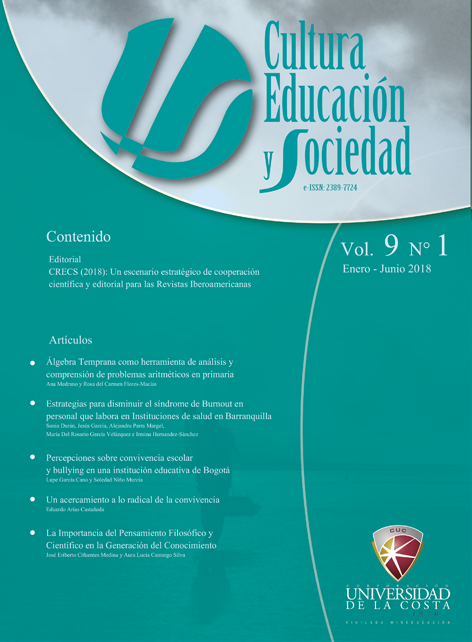Training in values and school coexistence through research as a pedagogical strategy supported by
DOI:
https://doi.org/10.17981/cultedusoc.9.1.2018.14Keywords:
Training in values; school life; research as a pedagogical strategy; TICAbstract
Values training has become a necessity at the educational level, because the school, in addition to imparting knowledge and developing competences, must train in competencies of the being that allow the individual to have an adaptation to social norms, thus offering an integral education taking the student as the center of the curriculum. The objective of the study was to strengthen education in values and school coexistence through research as a pedagogical strategy supported by ICT. It was guided under the qualitative approach, with an Investigation Action Participation (IAP) design. Where tools were used as a field diary and participant observation for data collection. A sample of forty (40) students from pre-school to first grade was taken between the ages of four (4) and six (6), of the preschool level of the Francisco de Paula Santander educational institution located in the municipality. of Foundation - Magdalena. The activities developed were made taking into account aspects such as research within the classroom and as a training process, in turn these activities were considered taking into account the ages of children and their context.
Downloads
References
Referencias bibliográficas
Acuña, A. (2003). La robótica educativa: un motor para la innovación. Fundación Omar Dengo San José, Costa Rica.
Almenara, J., & Cejudo, M. (2015). Tecnologías de la Información y la Comunicación (TIC): escenarios formativos y teorías del aprendizaje. Revista Lasallista de Investigación, 12(2), 186-193.
Avendaño, I., Cortés, O., & Guerrero, H. (2015). Competencias sociales y tecnologías de la información y la comunicación como factores asociados al desempeño en estudiantes de básica primaria con experiencia de desplazamiento forzado. Diversitas, 11(1), 13-36.
Barragán, F. (2012). Cultura de paz y violencia de género. En perspectiva, número 5. Sevilla, consejería de Educación y Ciencia
Belloch. (2012). Las Tecnologías de la Información y Comunicación en el aprendizaje. Universidad de Valencia.
BOJA. (2011). Orden de 20 de junio de 2011, promoción de la convivencia en los centros docentes sostenidos con fondos públicos y se regula el derecho de las familias a participar en el proceso educativo de sus hijos e hijas.
Carbajal, P. (2013). Convivencia democrática en las escuelas. Apuntes para una reconceptualizacion. Revista Iberoamericana de Evaluación Educativa, 6 (2), 13-35.
Cetrulo, R. (2001). Alternativas para una acción transformadora: Educación popular, ciencias y política. Montevideo: Ediciones Trilce-Instituto del Hombre.
De la Fuente, J., Peralta, F., & Sánchez, M. (2006). Valores sociopersonales y problemas de convivencia en la educación secundaria. Electronic Journal of Research in Educational Psychology, 4(9).
Gadotti, M. (2003). Perspectivas actuales de la educación. Buenos Aires: Siglo XXI.
Guevara, B., Zambrano, A., & Evies, A. (2007). ¿Para qué educar en valores? Revista educación en valores. Vol. 1 / Nº 7
Hernández, R., Fernández, C. y Baptista, P. (2010). Metodología de la investigación. 5ta Edición. México D.F.: Editorial McGraw Hill.
Herrera-Tapias, B. (2016). Cultura Ciudadana y las Tecnologías de la Información y la Comunicación. Editorial YOYOBIZ. Barranquilla-Colombia.
Machada, R. (2011). Women, War and Peace In South Asia: Beyond victimhood to Agency. New Delhi: Sage Publications.
Mejía, M. & Manjarrés M. (2010). Las pedagogías fundadas en la investigación. Búsquedas en la reconfiguración de la educación. Revista Internacional Magisterio 42: 16-26. Colombia.
Mejía, M. (2011). Las escuelas de la globalización. El conflicto por su reconfiguración. Bogotá: Desde Abajo.
Ortega, R., Del Rey, R., & Casas, J. A. (2013). La Convivencia Escolar: clave en la predicción del Bullying. Revista Iberoamericana de Evaluación Educativa, 6(2).
Pick, S. (2002). Formación cívica y ética/Civics and Ethics. Editorial Limusa.
Pozo, J. (2006). Aprender y enseñar ciencia. Madrid: Morata.
Ramírez, R. (2018). Tendencias emergentes de la gestión de talento humano en las organizaciones. Pp. 101-107. En Quintero Garzón Martha Lucia y Sánchez Fernández María Dolores. (2018) Responsabilidad Corporativa: una mirada integral en América Latina. Primera Edición. Colección Ciencias Sociales. Programa Editorial Universidad del Valle. Cali - Colombia. pp.324.
Ramírez, R., & Ampudia, D. (2018). Factores de Competitividad Empresarial en el Sector Comercial. Revista Electrónica de Ciencia y Tecnología del Instituto Universitario de Tecnología de Maracaibo (RECITIUTM). Vol. 4, N° 1. Pág.: 16-32.
Torres, A. (2007). La educación popular. Trayectoria y actualidad. Bogotá: El Búho.
Tuvilla, J. (2014). Convivencia escolar y resolución pacífica de conflictos. ISBN: 84-688-5500-6, Deposito legal: SE-1101-04.
Yurén, M. T., & de la Cruz, M. (2016). La relación familia-escuela: condición de mejora de la eficacia escolar en la formación valoral de niños (as) migrantes. REICE. Revista Iberoamericana sobre Calidad, Eficacia y Cambio en Educación, 7(2).
Wong, D.S.W., Cheng, C.H.K., Ngan, R.M.H. y Ma, S.K. (2010). Program effectiveness of a restorative whole-school approach for tackling school bullying in Hong Kong. International Journal of Offender Therapy and Comparative Criminology, 55(6), 846-862.
Downloads
Published
How to Cite
Issue
Section
License
Copyright (c) 2018 CULTURA EDUCACIÓN Y SOCIEDAD

This work is licensed under a Creative Commons Attribution-NonCommercial-NoDerivatives 4.0 International License.
![]()
Creative Commons 2020 CULTURA EDUCACIÓN Y SOCIEDAD
This article is under international license Creative Commons Reconocimiento-NoComercial-SinObrasDerivadas 4.0.
The published articles are the sole responsibility of their authors and do not necessarily reflect the opinions of the editorial committee.
CULTURA EDUCACIÓN Y SOCIEDAD respects the moral rights of its authors, who assign to the editorial committee the patrimonial rights of the published material. In turn, the authors inform that this work is unpublished and has not been previously published.
All articles are under a:
Licencia Creative Commons Atribución-NoComercial-SinDerivadas 4.0 Internacional.
![]()


 English
English
 Español (España)
Español (España)




_12.53_.27_p_. m_._3.png)





_12.57_.35_p_. m_._3.png)
_12.50_.37_p_. m_._3.png)



